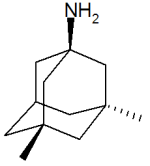Combo of Memantine and Sertraline Effective for Unipolar Depression
A 2016 study in the Journal of Clinical Pharmacy and Therapeutics finds that the combination of memantine (Namenda), a drug used to treat Alzheimer’s disease, and the antidepressant sertraline (Zoloft) improved unipolar depression more than sertraline plus placebo.
The study by Meysam Amidfar and colleagues included 66 patients with moderate to severe unipolar depression. They were divided into two groups—one received sertraline plus memantine for six weeks, while the other received sertraline and a placebo.
The memantine group showed significantly greater improvement at 2 weeks, 4 weeks, and 6 weeks, and significantly greater response at 4 and 6 weeks. There were also more early improvers in the mematine group, and more rapid response to treatment. Both groups improved significantly over the six weeks of treatment.
Larger studies are needed to learn more about the safety and efficacy of memantine combined with sertraline for the treatment of unipolar depression, but this initial study is promising. In 2012, researcher Amit Anand and colleagues reported that in bipolar depression, memantine potentiates the effects of lamotrigine. Memantine also helped rapid cyclers when added to ongoing treatment in an open study of the drug treatment by Athanasios Koukopoulus and colleagues in 2012.
Alzheimer’s Treatments May Work for Memory Dysfunction in Depression
In a recent BNN article on potential drugs for memory loss, we omitted two conventional classes of drugs used to treat Alzheimer’s Disease—acetylcholine esterase inhibitors (AChE-Is) and the blocker of glutamate NMDA receptors memantine (Namenda). This was intentional, as we hoped to suggest possible approaches prior to the use of these drugs for full-blown dementia. However, we neglected to cite a 1999 study by Fred Jacobsen in the Journal of Clinical Psychiatry that indicated that the AChE-I drug donepezil (Aricept) was effective in improving drug-induced memory dysfunction in patients without dementia. Side effects included insomnia, nausea, vomiting, and diarrhea.
Jacobsen has used AChE-Is to improve memory in over 80 patients with unipolar or bipolar depression, aged 19-85. In a 2016 personal communication to the BNN, he indicated that doses of 5mg/day are typically enough to improve memory. Higher doses of 10mg/day may be more effective, but increase the risk of switching into mania for patients with bipolar depression. Some of Jacobsen’s patients have used AChE-I drugs for 10–15 years without the drugs losing effectiveness. For some patients, Jacobsen has switched from prescribing donezepil to prescribing rivastigmine (Exelon or Exelon patch), which he finds they can more easily tolerate.
We should also remind readers of the BNN of our previous report on memantine (Namenda) for bipolar depressed patients with cognitive impairment. We wrote, “In an abstract presented at the 67th Annual Meeting of the Society of Biological Psychiatry in 2012, Dan V. Iosifescu reported that in a randomized 12-week study in which the anti-Alzheimer’s drug memantine was given to 72 euthymic bipolar subjects experiencing cognitive deficits, the drug was associated with improvement in spatial and working memory, verbal and episodic memory, and other indices that included measurements of attention and language skills. In conjunction with this treatment, a subgroup of subjects had increases in left hippocampal NAA (a measure of neuronal viability) and increases in choline in the right hippocampus. The initial improvements in these neuropsychological test results remained over 12 weeks of open follow-up.”
In an earlier proof-of-concept study published in the journal CNS Neuroscience and Therapeutics in 2009, Iosifescu had also reported that among nineteen subjects with bipolar disorder that was in remission, but who had residual cognitive deficits, open-label treatment with the AChE-I galantamine (extended release) at doses of 8–24 mg/day led to improvement in those cognitive symptoms after 4 months.
More Data on Memantine for Treatment-Resistant Depression
In 2012 we reported on an open study by Athanasios Koukopoulos and colleagues that explored whether the NMDA glutamate receptor antagonist memantine (Namenda), which is used to treat dementia, could be helpful to people with treatment-resistant bipolar disorder. In an update of that study, the researchers, led by Giulia Serra, compared patients’ symptoms during three years of treatment as usual, followed by three years with memantine added to their stable medication regime (at doses of 20–30 mg/day). Patients improved progressively over the three years of taking memantine.
Improvements in symptoms included decreased time ill, decreased severity of symptoms, decreased duration of new episodes, and fewer episodes per year. Memantine was particularly helpful for those patients who had had rapid or continuous cycling. Side effects were minimal.
Given the success of this open study, randomized controlled trials are needed to explore this much-needed option for people with treatment-resistant bipolar disorder.
Memantine May Be Useful in OCD, ADHD, and Autism
Memantine (Namenda) is an N-methyl-D-aspartate (NMDA) glutamate receptor antagonist that is FDA-approved for the treatment of Alzheimer’s dementia. Its use in other illnesses such as bipolar disorder and autism is currently being explored.
As we have written in previous issues of the BNN, A. Anand et al. reported in 2012 that in bipolar depression, memantine has an initial antidepressant augmentation effect when added to lamotrigine, an inhibitor of glutamate release. Koukopoulos et al. also reported in 2012 that in an open study, memantine had a large and sustained effect in previously treatment-resistant patients with bipolar disorder, producing an impressive 60-70% rate of excellent response at 6 months and again at 12 months of follow-up.
There is some evidence that memantine can be useful in obsessive-compulsive disorder (OCD). In a randomized double-blind placebo-controlled study of memantine combined with fluoxetine published by Ghaleiha et al. in 2012, patients with moderate to severe OCD taking memantine and fluoxetine were more likely to achieve remission after 8 weeks than patients taking placebo and fluoxetine.
Attention-deficit/hyperactivity disorder (ADHD) is another condition that memantine may be able to treat. Disturbances in NMDA receptor activity are thought to play a role in ADHD. Small, preliminary studies of memantine in ADHD have been promising.
New research has begun to explore memantine’s effects in autism. In one recent randomized, double-blind, placebo-controlled study published by Ghaleiha et al. in the International Journal of Neuropsychopharmacology, memantine produced improvement in children with autistic disorder when the drug was added to a treatment regimen that included risperidone, which blocks dopamine D2 receptors and is FDA-approved for the treatment of schizophrenia and mania, as well as autism.
However, at the 2012 meeting of the American Academy of Child and Adolescent Psychiatry, Robert Findling presented a poster on extended release memantine (Namenda) in children with autism, a study with negative results. This was a monotherapy study, unlike the above studies in which memantine was added to treatment with another drug. Findling found that extended release memantine (at doses of 3mg to 15mg per day) was well tolerated in children with autism, but the drug on its own was not significantly more effective than placebo in these preliminary studies.
Editor’s Note: Taken together, these data suggest an emerging role for memantine and possibly other drugs that work through NMDA receptor blockade in several disorders associated with repetitive behavior, like OCD and autism. The role of memantine augmentation in each of these syndromes deserves further exploration.
When Added to Valproate, Memantine Increased HDLs (“Good” Cholesterol) But Did Not Enhance Effectiveness of Treatment
R.B. Lu and S.Y. Lee reported in a poster at the 5th Biennial Conference of the International Society for Bipolar Disorders in 2012 that adding memantine (Namenda) to treatment with valproate (Depakote) was associated with increases in high-density lipoproteins (HDLs) or “good” cholesterol in bipolar II depressed patients. However, the combination was no more clinically effective than valproate alone in treating the patients’ bipolar illness, as had been hoped.
Editor’s Note: These data on memantine’s failure to improve patients’ bipolar illness when used as an adjunct to valproate contrast with those of Amit Anand et al., who reported in 2012 that memantine was a partially successful adjunctive treatment when added to ongoing treatment with lamotrigine. This combination of lamotrigine plus memantine was associated with faster and more robust antidepressant effects than the combination of lamotrigine plus placebo in patients with bipolar depression. This effect was significant in the first four weeks of the study as the dose of memantine was slowly increased from 5mg/day to 20mg/day, but not over the last four weeks of treatment at 20 mg/day.
The data of Anand et al. makes theoretical sense. Since lamotrigine inhibits the release of glutamate and memantine inhibits the actions of glutamate at the NMDA receptor, the two together might produce additive decrements in glutamatergic actions through two different mechanisms. In contrast, valproate is more closely associated with increases in GABAergic mechanisms, and this may explain why its effects on bipolar disorder were not improved by the addition of memantine.
Anti-Alzheimer’s Drug Memantine (Namenda) Has Positive Effects On Cognitive Dysfunction In Patients With Bipolar Disorder
 Many patients with bipolar disorder experience cognitive dysfunction, but few treatments are available for this aspect of the illness. In an abstract presented at the 67th Annual Meeting of the Society of Biological Psychiatry in 2012, Dan V. Iosifescu reported that in a randomized 12-week study in which the anti-Alzheimer’s drug memantine was given to 72 euthymic bipolar subjects experiencing cognitive deficits, the drug was associated with improvement in spatial and working memory, verbal and episodic memory, and other indices that included measurements of attention and language skills. In conjunction with this treatment, a subgroup of subjects had increases in left hippocampal NAA (a measure of neuronal viability) and increases in choline in the right hippocampus. The initial improvements in these neuropsychological test results remained over 12 weeks of open follow-up.
Many patients with bipolar disorder experience cognitive dysfunction, but few treatments are available for this aspect of the illness. In an abstract presented at the 67th Annual Meeting of the Society of Biological Psychiatry in 2012, Dan V. Iosifescu reported that in a randomized 12-week study in which the anti-Alzheimer’s drug memantine was given to 72 euthymic bipolar subjects experiencing cognitive deficits, the drug was associated with improvement in spatial and working memory, verbal and episodic memory, and other indices that included measurements of attention and language skills. In conjunction with this treatment, a subgroup of subjects had increases in left hippocampal NAA (a measure of neuronal viability) and increases in choline in the right hippocampus. The initial improvements in these neuropsychological test results remained over 12 weeks of open follow-up.
Editor’s Note: These data are of considerable importance. Many studies indicate that the severity of the cognitive dysfunction patients experience while euthymic varies directly as a function of the number of prior episodes of mania or depression they have experienced. The degree of cognitive dysfunction in patients with bipolar disorder is also correlated with disability in social and economic functioning. Thus, the data that memantine can lead to improvement in several types of memory tests suggest that the drug could be useful in treating these deficits in some patients with bipolar disorder.
Memantine acts in part by blocking glutamate NMDA receptors and provides a different mechanism of action compared to the other drugs used to treat Alzheimer’s, which increase acetylcholine by blocking acetylcholinesterase.
Memantine has also shown promising effects in enhancing the antidepressant effects of lamotrigine, a drug that inhibits glutamate release. Thus, the similar target of action by which lamotrigine (blocking glutatmate release) and memantine (blocking glutamate receptors) operate suggest that the two drugs used in conjunction might produce additive effects in decreasing glutamate function. The current data suggest that memantine compared to placebo as an add-on to other agents in euthymic bipolar patients improves several measures of cognition as well.
New data published by Koukopoulos in the Journal of Affective Disorders in 2012 suggest that memantine (10-30mg/day) is an effective add-on treatment in severely ill patients with treatment-resistant bipolar disorder. Among those in Koukopoulos’ study, 72.5% were much or very much improved, thus there is a strong rationale for considering this drug.
High Sustained Success Rate With Adjunctive Memantine (Namenda) in Treatment-Resistant Bipolar Disorder
Koukopoulos et al. published a study of the anti-Alzheimer’s drug memantine in the Journal of Affective Disorders in 2012. The study of memantine (10-30mg/day) as an add-on to patients’ regular treatment for highly treatment-resistant bipolar disorder was open (i.e. not blind, randomized or placebo-controlled), but it deserves careful attention for its noteworthy results. Of the 40 patients in the study, who had been severely ill for long periods of time, 72.5% showed a rating of much or very much improved on the Clinical Global Impressions Scale for Bipolar Disorders (CGI-BP) after both 6 months and 12 months. Among rapid cyclers, 68.4% stabilized and remitted on memantine.
Editor’s Note: Memantine is an antagonist of glutamate NMDA receptors and is approved by the Federal Drug Administration (FDA) for the treatment of Alzheimer’s dementia, but not for other indications. Nonetheless, few (if any) drugs have this high a response rate in such a difficult-to-treat population, and the researchers suggest that even based on these preliminary data (which replicate their previous observations), careful clinical trials of memantine in individual patients would be worthy of consideration.
The data are so promising that fast-track development of this drug for FDA approval would be warranted. More formal randomized controlled clinical trials are needed.
We have written before about a few treatments that have rapid-onset antidepressant effects, including intravenous (IV) ketamine (at a dose of 0.5mg over 40 minutes). Ketamine works by blocking glutamate NMDA receptors, but the rapid antidepressant effects it produces (within 2 hours of treatment) last only 3 to 4 days. Given the similar mechanisms of action of ketamine and memantine and memantine’s high success rate in this study by Koukopoulos, it is plausible that treatment with memantine could extend the rapid onset effects of IV ketamine. However, this speculation has not yet been tested. At the very least, the similarity between the mechanisms of memantine and ketamine in blocking the glutamate NMDA receptor lends additional support to the clinical rationale for treating bipolar disorder with adjunctive memantine.
Possible Antidepressant Effects of Memantine
 In an 8-week study of memantine for augmentation of treatment with lamotrigine for bipolar depression, memantine’s effects were not statistically significant. However, during the first four weeks of the study, while memantine doses were slowly increased, memantine was associated with significant improvements on the Hamilton Depression Rating Scale (HDRS).
In an 8-week study of memantine for augmentation of treatment with lamotrigine for bipolar depression, memantine’s effects were not statistically significant. However, during the first four weeks of the study, while memantine doses were slowly increased, memantine was associated with significant improvements on the Hamilton Depression Rating Scale (HDRS).
From the abstract:
This proof-of-concept study failed to show a statistically significant benefit of memantine augmentation of lamotrigine for patients with BD-D over eight weeks. However, memantine had an antidepressant effect early on in the treatment while its dose was being titrated up. Larger placebo-controlled studies are needed to ascertain optimal timing and dosing for memantine augmentation of lamotrigine in BD-D.
Update: Memantine as an Adjunct to Lamotrigine for Bipolar Depression
Memantine (Namenda), which is approved by the Federal Drug Administration (FDA) for use in Alzheimer’s Dementia, is increasingly being used for other conditions. Some doctors prescribe memantine for hyperactivity and attention problems in attention deficit hyperactivity disorder (ADHD), for obsessive compulsive disorder (OCD), and most recently as an adjunct to lamotrigine in bipolar depression. We wrote about the findings of Amit Anand et al. on the use of memantine and lamotrigine in January. These findings have just been published in Bipolar Disorders. The study indicates that the combination of lamotrigine with memantine brought about a rapid onset and greater magnitude of antidepressant effects than the combination of lamotrigine and placebo. The initial dose of memantine was 5mg/day, which was increased to 20mg/day during the study.
Editor’s Note: The potential mechanism of this effect makes sense. Lamotrigine decreases release of glutamate, and memantine blocks glutamate’s actions at the NMDA receptor. Thus the two together would more efficiently decrease glutamate’s effects.
It is possible that memantine could be effective without effecting the normal functions of glutamate. The drug blocks NMDA glutamate receptors that are situated away from the synapse, while allowing NMDA glutamate receptors at the synapse to fulfill their normal functions that support learning and memory. The blocking of only those receptors outside the synapse (extra-synaptic) could explain why memantine has relatively few side effects.
Memantine for Adult ADHD
At the 57th Annual Meeting of the American Academy of Child and Adolescent Psychiatry (AACAP) in October 2010, Craig Surman of Massachusetts General Hospital reported results from an open study suggesting that the anti-Alzheimer’s drug memantine (Namenda) was effective in the treatment of ADHD in adults.
Editor’s Note: Gianni Faedda also indicated to this writer that he had successfully used memantine, an antagonist of the glutamate NMDA receptor, for children with ADHD. He observed that memantine was also helpful in several of his treatment-resistant bipolar patients. Based on these anecdotal observations, this compound deserves further systematic exploration. It is also noteworthy that Amit Anand and colleagues found that memantine increased antidepressant response to lamotrigine in bipolar depression compared to placebo.








